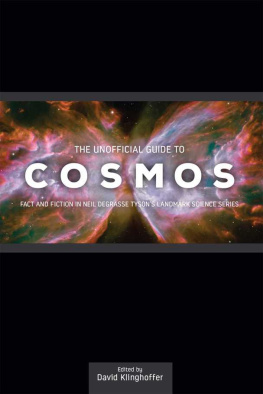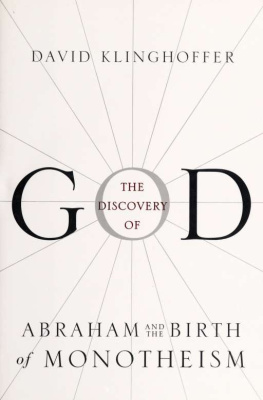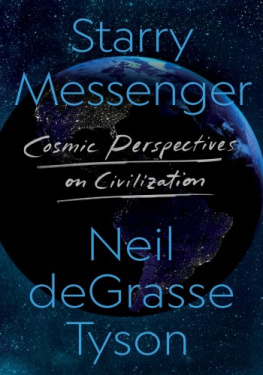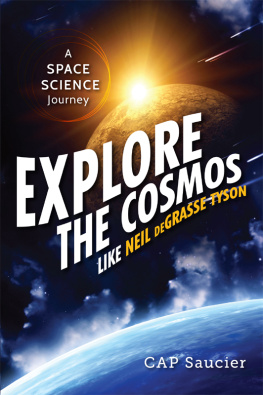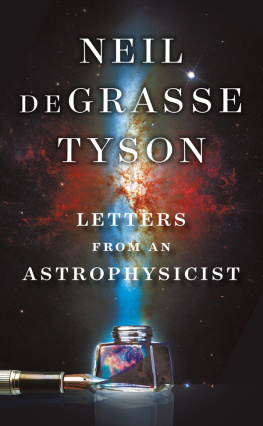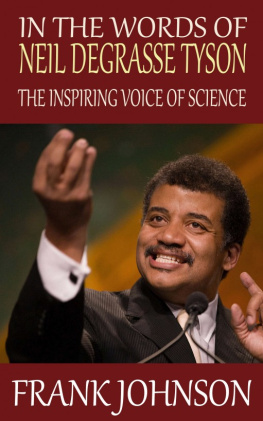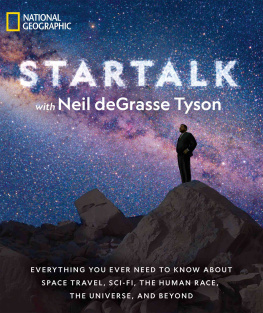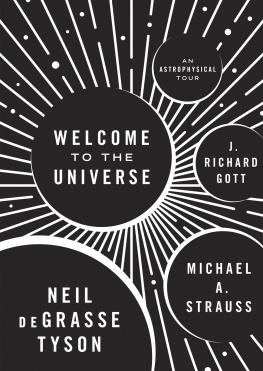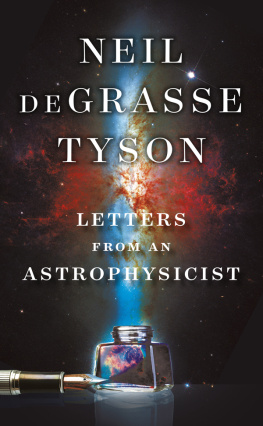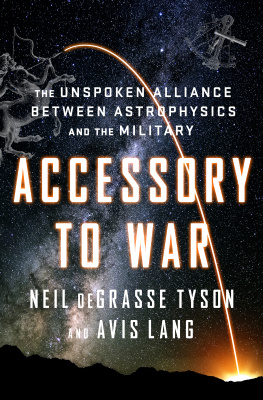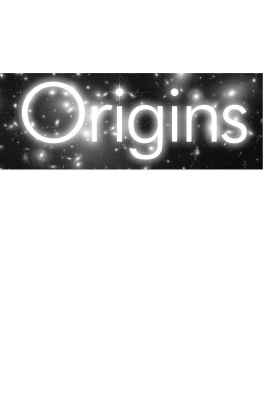THE
UNOFFICIAL
GUIDE
TO
COSMOS
FACT AND FICTION IN
NEIL DEGRASSE TYSONS
LANDMARK SCIENCE SERIES
DAVID KLINGHOFFER, EDITOR
DISCOVERY INSTITUTE PRESS SEATTLE 2014
Description
In this unofficial viewers guide to astrophysicist Neil deGrasse Tysons reboot of the classic Cosmos TV series, contributors dissect each episode and explain where Tyson turns from objective science to scienceflavored and fact-challenged preaching. Students, parents, and teachers will find this lively compendium a useful counterpoint to the new Cosmos series.
Copyright Notice
Copyright 2014 by Discovery Institute. All Rights Reserved.
Publishers Note
This book is part of a series published by the Center for Science & Culture at Discovery Institute in Seattle. Previous books include Science and Human Origins by Ann Gauger, Douglas Axe, and Casey Luskin; The Myth of Junk DNA by Jonathan Wells; The Deniable Darwin & Other Essays by David Berlinski; and The Magicians Twin: C.S. Lewis on Science, Scientism, and Society, edited by John G. West.
Library Cataloging Data
The Unofficial Guide to Cosmos: Fact and Fiction in Neil deGrasse Tysons
Landmark Science Series
Edited by David Klinghoffer. Contributions by David Klinghoffer, Jay
Richards, Casey Luskin, and Douglas Ell.
BISAC Subject: SCI015000 SCIENCE / Cosmology
BISAC Subject: SCI034000 SCIENCE / History
BISAC Subject: SCI075000 SCIENCE / Philosophy & Social Aspects
ISBN-13
978-1-936599-24-0 (Kindle)
978-1-936599-25-7 (EPUB)
978-1-936599-22-6 (Paperback)
Publisher Information
Discovery Institute Press, 208 Columbia Street, Seattle, WA 98104
Internet: http://www.discoveryinstitutepress.com/
Published in the United States of America on acid-free paper.
First Edition, First Printing. October 2014.
Cover Design: Brian Gage
Interior Layout: Michael W. Perry
Contents
David Klinghoffer
David Klinghoffer
David Klinghoffer
Casey Luskin
Jay W. Richards
Casey Luskin
Casey Luskin
Casey Luskin
Evolution News & Views
Jay W. Richards
Casey Luskin
David Klinghoffer
Casey Luskin
David Klinghoffer
Casey Luskin
Casey Luskin
Jay W. Richards
Casey Luskin
Jay W. Richards
Casey Luskin
David Klinghoffer
David Klinghoffer
David Klinghoffer
Casey Luskin
Jay W. Richards
David Klinghoffer
Casey Luskin
Casey Luskin
Casey Luskin
Douglas Ell
INTRODUCING COSMOS
1.
WHY THIS SUBVERSIVE BOOK?
David Klinghoffer
C OSMOS: A SPACETIME ODYSSEY IS THE 2014 REIMAGINING OF CARL Sagans influential and esteemed public-television documentary series, Cosmos: A Personal Voyage (1980). There seems every reason to think that with the highly regarded astrophysicist Dr. Tyson as its genial host, graced by accessible science, gorgeous and expensive animation, critical acclaim, 12 Emmy Award nominations, and all around top-notch entertainment value, the new Cosmos will prove to be a fixture in public and private schools, used as a welcome supplement by science teachers seeking to enliven student interest in cosmology, biology, and more.
We present The Unofficial Guide to Cosmos as an aid to students, parents, and teachers seeking another perspective on the profound questions raised in the series by Dr. Tyson, questions that Cosmos seeks to answer in an often alarmingly one-sided fashion. The program pursues a definite philosophical agenda without ever once acknowledging that fact. It should not go unchallenged, even at the risk of appearing disrespectful of authorities like Dr. Tyson and Dr. Sagan.
Both the original and the revival are 13 episodes in total. During those weeks that the new series first aired, a question that was the subject of water-cooler discussion in our offices was: What is Cosmos about?
As the title suggests, it offers what is very broadly speaking a tour of the cosmos and a retelling of the story of how science came to understand mans place in the universe. But an odd thing about the programvery expensively produced and broadcast by the Fox Network and the National Geographic Channelis that it follows no obvious organizational scheme. In all our coverage of the series, we could identify no rhyme or reason to why one subject followed another, either at the level of an individual episode or of the entire 13-hour series.
In fact, only one episode was clearly focused on a particular topic, , about global warming, which itself seems at first glance to have no connection to the subject of the series.
But it does. Cosmos makes sense once you understand that it comprises an instructional course in a way of conceiving the world, a prestigious one in academia but highly corrosive in our culture. This worldview has no completely satisfactory name, but many would call it materialism, premised on the idea that material stuff is ultimately all there is in existence. In the famous words of astronomer Carl Sagan in the original series, The cosmos is all that is, or ever was, or ever will be.
Under a materialist view, spirit, soul, ideas, information have no real existence. The universe and all the life in it arose by blind, unguided material processes. Religious faith is always a hindrance and never an inspiration to scientific investigation. The opposite view, going back millennia to ancient Greece, the Bible, through to the rise of modern science and beyond, is associated with the proposition that the cosmos gives evidence of intelligent design (ID). This design-based perspective argues that matter derives its existence from an underlying immaterial reality: wisdom, providence, design, information, call it what you will. Intelligent-design advocates including Stephen C. Meyer and William Dembski have argued that both at the origin of the universe and through the history of life, information not matter has come first.
On initially encountering them, these sound like abstract ideas. However, their real-world impact couldnt be more concrete or intimate. Materialism undergirds a widespread prejudice that equates humans with animals. It denies there is anything exceptional about the human race or planet Earth, that we have any appointed destiny, mission or purpose. Many of its adherents find the advancement of human settlement of the globe to be itself an offense against nature and our equals in the animal world. Hence the preoccupation with nightmare climate-change scenarios, casting human beings as a proliferating plague on the Earth.
Exploring the relative scientific and intellectual merit of these competing views of the universeintelligent design versus scientific materialismand illuminating their cultural consequences is the primary work of Discovery Institutes Center for Science & Culture. It was only natural that our scientists and scholars followed the rollout of Cosmos with interest and concern.
There is much to debate about the content of the rebooted Cosmos, not least considering that even supporters of the program in the academic world acknowledged that its writers and producers sought to advance their argument by playing loose with the factsindulging in what one friendly historian of science called taradiddles, an innocent-sounding word that in fact means a deliberate untruth, a lie (see ).
Is the word lie too strong in this context? We try to extend charity to all and so avoid, if possible, accusing others of lying. It seems more likely that Dr. Tyson is misled by his own preferred narrative, the story he tells himself about how the world works. The story determines what does and doesnt count as a fact.
Next page
